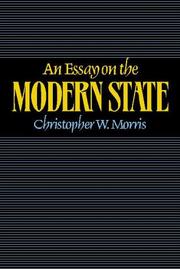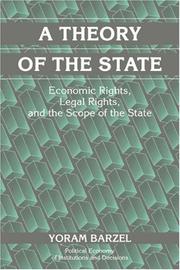| Listing 1 - 10 of 5784 | << page >> |
Sort by
|
Book
ISBN: 0335105971 Year: 1984 Publisher: Milton Keynes Open University Press
Abstract | Keywords | Export | Availability | Bookmark
 Loading...
Loading...Choose an application
- Reference Manager
- EndNote
- RefWorks (Direct export to RefWorks)
State, The --- Administration --- Commonwealth, The --- Sovereignty --- Political science

ISBN: 0415086833 0415086809 0415086817 0415086825 Year: 1994 Publisher: London : Routledge,
Abstract | Keywords | Export | Availability | Bookmark
 Loading...
Loading...Choose an application
- Reference Manager
- EndNote
- RefWorks (Direct export to RefWorks)
State, The --- Etat --- Administration --- Commonwealth, The --- Sovereignty --- Political science
Book
ISBN: 0585092435 9780585092430 143842373X Year: 1986 Publisher: Albany, N.Y. : State University of New York Press,
Abstract | Keywords | Export | Availability | Bookmark
 Loading...
Loading...Choose an application
- Reference Manager
- EndNote
- RefWorks (Direct export to RefWorks)
State, The. --- Administration --- Commonwealth, The --- Sovereignty --- Political science
Book
ISBN: 8490850895 9788490850893 9788490850589 Year: 2014 Publisher: Madrid : Dykinson,
Abstract | Keywords | Export | Availability | Bookmark
 Loading...
Loading...Choose an application
- Reference Manager
- EndNote
- RefWorks (Direct export to RefWorks)
State, The. --- El Estado. --- Administration --- Commonwealth, The --- Sovereignty --- Political science
Book
ISBN: 303071411X 3030714101 Year: 2021 Publisher: Cham, Switzerland : Palgrave Macmillan,
Abstract | Keywords | Export | Availability | Bookmark
 Loading...
Loading...Choose an application
- Reference Manager
- EndNote
- RefWorks (Direct export to RefWorks)
State, The. --- Administration --- Commonwealth, The --- Sovereignty --- Political science
Book

ISBN: 9780191749704 Year: 2015 Publisher: Oxford Oxford University Press
Abstract | Keywords | Export | Availability | Bookmark
 Loading...
Loading...Choose an application
- Reference Manager
- EndNote
- RefWorks (Direct export to RefWorks)
The state remains the most important political unit of the modern world. In the most recent phase of globalization the role and position of the state has changed, but after a short intermezzo in which nothing less than the “end of the state” was frequently proclaimed, the social sciences have reached consensus about the ongoing centrality of states. This Handbook focuses on state transformations. Transformations are fundamental changes of the state. We take into consideration the entire period from the emergence of the nation-state in Europe to the present but we concentrate on state transformations over the past four decades. This Handbook presents the latest social science knowledge about the state and its transformations along with issues for further research. Transformations of the state are considered for all regions of the world, for countries in economically advanced and less developed regions, for young states and those which can look back at a long tradition of state development, for democratic states and authoritarian regimes, for countries with (previously) socialist economic systems and the states where the idea of liberal market economies originated, for states with a colonial past and their erstwhile colonial masters. It is challenging and ambitious to examine such a wide range of states and their transformations, even in an exten¬sive Handbook profiting from the participation of a large number of leading experts.
State, The --- Administration --- Commonwealth, The --- Sovereignty --- Political science

ISBN: 052149625X 0521524075 0511609124 9780521496254 9780511609121 9780521524070 Year: 1998 Publisher: Cambridge (UK): Cambridge university press,
Abstract | Keywords | Export | Availability | Bookmark
 Loading...
Loading...Choose an application
- Reference Manager
- EndNote
- RefWorks (Direct export to RefWorks)
This important book is the first serious philosophical examination of the modern state. It inquires into the justification of this particular form of political society. It asks whether all states are 'nation-states', what are the alternative ways of organizing society, and which conditions make a state legitimate. The author concludes that, while states can be legitimate, they typically fail to have the powers (e.g sovereignty) that they claim. Many books analyze government and its functions but none focuses on the state as a distinctive form of political organization or examines critically the claims states make for themselves. In filling this lacuna Christopher Morris has written a book that will command the attention of political philosophers, political scientists, legal theorists, and specialists in international relations.
Political philosophy. Social philosophy --- State, The. --- Arts and Humanities --- Philosophy --- Administration --- Commonwealth, The --- Sovereignty --- Political science

ISBN: 0521806054 0521000645 0511606184 0511826192 Year: 2002 Publisher: Cambridge : Cambridge university press,
Abstract | Keywords | Export | Availability | Bookmark
 Loading...
Loading...Choose an application
- Reference Manager
- EndNote
- RefWorks (Direct export to RefWorks)
This book models the emergence of the state, and the forces that shape it. State creation is bound to protection needs. A specialized protector-ruler is efficient, but is also self-seeking. Individuals will install a ruler only after they create a mechanism to control him. Among the offshoots of the organized protection are legal system and decision-making procedures that include voting. The initial 'state of nature' may gradually evolve into a rule-of-law state. The state endows individuals with rights by delineating what it will protect. Enforcement, however, is never perfect. People use third parties such as firms to enforce agreements. As commodities become standardized, scale economies increase. In order to exploit the economies of within-state enforcement, the state will expand the contact enforcement territory by treaty or by conquest. The force may explain the creation of rule-of-law empires.
Economic order --- State, The. --- Social Sciences --- Political Science --- Administration --- Commonwealth, The --- Sovereignty --- Political science

ISBN: 185278413X Year: 1992 Volume: 3 Publisher: Aldershot Elgar
Abstract | Keywords | Export | Availability | Bookmark
 Loading...
Loading...Choose an application
- Reference Manager
- EndNote
- RefWorks (Direct export to RefWorks)
Political sociology --- State, The --- Etat --- Administration --- Commonwealth, The --- Sovereignty --- Political science
Book
ISBN: 906695079X Year: 1993 Publisher: Leiden DSWO Press
Abstract | Keywords | Export | Availability | Bookmark
 Loading...
Loading...Choose an application
- Reference Manager
- EndNote
- RefWorks (Direct export to RefWorks)
Political sociology --- State, The --- #A9405A --- Administration --- Commonwealth, The --- Sovereignty --- Political science
| Listing 1 - 10 of 5784 | << page >> |
Sort by
|

 Search
Search Feedback
Feedback About UniCat
About UniCat  Help
Help News
News